The Roman legion was the largest military unit of the Roman army, composed of 4,200 infantry and 300 equites (cavalry) in the period of the Roman Republic ; and was composed of 5,200 infantry and 120 auxilia in the period of the Roman Empire

Sir Anthony Hope Hawkins, better known as Anthony Hope, was a British novelist and playwright. He was a prolific writer, especially of adventure novels but he is remembered predominantly for only two books: The Prisoner of Zenda (1894) and its sequel Rupert of Hentzau (1898). These works, "minor classics" of English literature, are set in the contemporaneous fictional country of Ruritania and spawned the genre known as Ruritanian romance, books set in fictional European locales similar to the novels. Zenda has inspired many adaptations, most notably the 1937 Hollywood movie of the same name and the 1952 version.

Pompeii is a novel by Robert Harris, published by Random House in 2003. It blends historical fiction with the real-life eruption of Mount Vesuvius on 24 August 79 AD, which overwhelmed the town of Pompeii and its vicinity. The novel is notable for its references to various aspects of volcanology and use of the Roman calendar. In 2007, a film version of the book had been planned and was to be directed by Roman Polanski with a budget of US$150 million, but was cancelled due to the threat of a looming actors' strike.

Alfred Edward Woodley Mason was an English author and politician. He is best remembered for his 1902 novel of courage and cowardice in wartime, The Four Feathers and is also known as the creator of Inspector Hanaud, a French detective who was an early template for Agatha Christie's famous Hercule Poirot.
Roger Gilbert Lancelyn Green was a British biographer and children's writer. He was an Oxford academic who formed part of the Inklings literary discussion group along with C. S. Lewis and J. R. R. Tolkien.
"The Man Who Was Never Born" is an episode of the original The Outer Limits television show. It was first broadcast on October 28, 1963, during the first season.
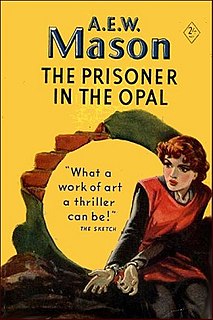
The Prisoner in the Opal is a British detective novel by A.E.W. Mason, serialised in The Pall Mall Magazine and published as a novel in 1928. It is the third full-length novel in Mason's Inspector Hanaud series, and the only one to feature the occult as a significant plot point.
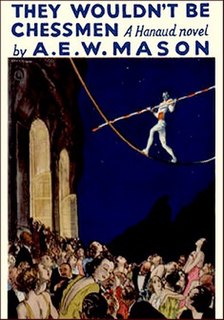
They Wouldn't Be Chessmen is a 1935 British detective novel by A.E.W. Mason. It is the fourth full-length novel in Mason's Inspector Hanaud series.

The House in Lordship Lane is a 1946 British detective novel by A.E.W. Mason. It is the fifth and final full-length novel in Mason's Inspector Hanaud series, published when the author was eighty-one. Unlike the others in the series the story is largely set in England, the Lordship Lane of the title being a thoroughfare in East Dulwich, South London.
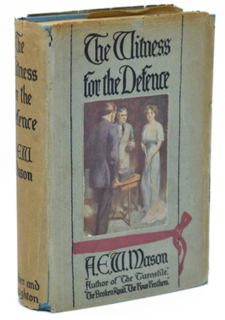
The Witness for the Defence is a 1913 mystery and adventure novel by the English novelist A. E. W. Mason, published by Hodder & Stoughton. Considered one of Mason's best, it was adapted by the author from his 1911 stage play of the same name. In 1919 it was made into an American silent film The Witness for the Defense directed by George Fitzmaurice.

Running Water is a 1907 adventure novel by the British writer A.E.W. Mason. The story could be defined as mountaineering crime fiction with a romantic twist.

Miranda of the Balcony is a novel by the British writer A.E.W. Mason, first published 6 October 1899. It has been noted as a modern re-telling of Homer's Odyssey and one of the sources used by James Joyce for his 1922 novel Ulysses.
Gaius Dillius Aponianus was a Roman senator and general, who played a role in the Year of Four Emperors. Aponianus ended up supporting Vespasian, and as a reward he was appointed suffect consul during the early years of that emperor.

The Turnstile is a 1912 political novel by the English author A. E. W. Mason.

The Affair at the Semiramis Hotel is a 1917 detective novella by the British writer A. E. W. Mason featuring his character Inspector Hanaud. Mason had originally written many of the plot elements for an abortive silent film, to be called The Carnival Ball. The novella appeared between Mason's first full-length Hanaud novel, At the Villa Rose (1910), and his second, The House of the Arrow (1934).

The Summons is a 1920 novel of adventure and romance by A. E. W. Mason, published by Hodder & Stoughton. Set just before and during the Great War, the novel recounts the adventures of Martin Hillyard, a secret service agent, and his army officer friend Harry Luttrell who aims to restore the battered reputation of his regiment.
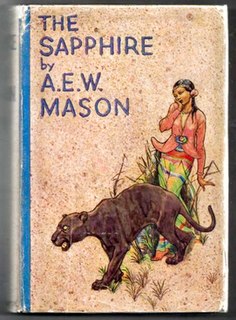
The Sapphire is a 1933 novel of mystery and adventure by A. E. W. Mason, published by Hodder & Stoughton.

Musk and Amber is a 1942 adventure novel by A. E. W. Mason, set in Eighteenth-century England and Italy. It was his penultimate work, written at the age of 76, and has been considered his very best.
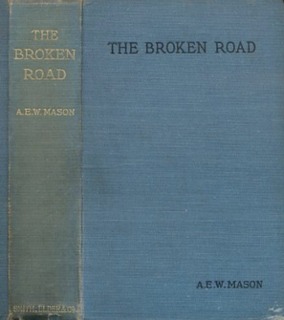
The Broken Road is a 1907 novel of adventure and romance by A. E. W. Mason, set in India during the period of British rule. It first appeared in serial form in The Cornhill Magazine. As a result of the book's publication, the British Government abolished a regulation that had prevented soldiers of the British Indian Army, no matter how valorous, from being eligible to receive the Victoria Cross.















